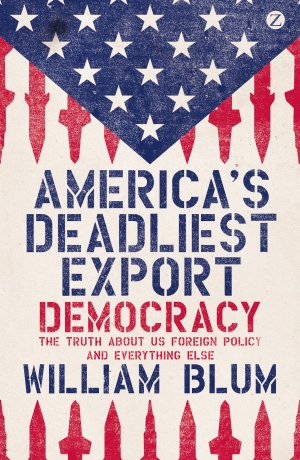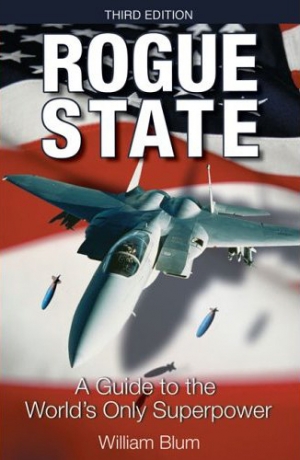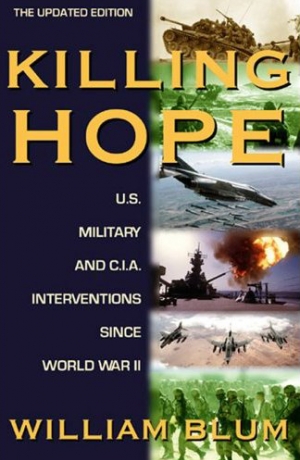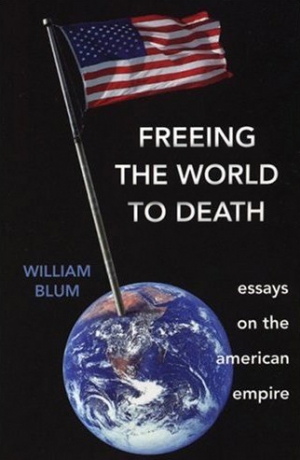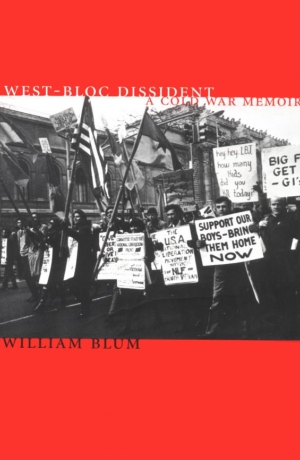The Anti-Empire Report #11
By William Blum – Published July 14th, 2004
He’s baaaaack! You mean he was gone?
For those of you who’ve been wondering why there hasn’t been an Anti-Empire Report in a while – at least three of you? – it’s because I was very busy finishing a new book. The book is called “Freeing the World to Death: Essays on the American Empire”, a collection of short pieces of mine, including all previous Anti-Empire Reports, and other essays both old and new. Here’s a little sample from the Introduction:
“We can say that the United States runs the world like the Taliban ran Afghanistan. Cuba is dealt with like a woman caught outside not wearing her burkha. Horrific sanctions are imposed on Iraq in the manner of banning music, dancing, and kite-flying in Kabul. Jean-Bertrand Aristide is banished from Haiti like the religious police whipping a man whose beard is not the right length.”
Ronnie forgot all this, but we shouldn’t
It’s not too late is it, to pay a few more respects to Ronald Reagan? Here are a few items from my file.
A paraphrased summary of Reagan’s excuses during L’affaire Contragate, also known as L’affaire Irangate:
I didn’t know what was happening.
If I did know, I didn’t know enough.
If I knew enough, I didn’t know it in time.
If I knew it in time, it wasn’t illegal.
If it was illegal, the law didn’t apply to me.
If the law applied to me, I didn’t know what was happening.
Margaret Thatcher had this to say about her supposed great friend Ronnie: “Poor dear, there’s nothing between his ears.” 1
In 1984, Reagan spoke to a group of American newspaper editors about possibly limiting a nuclear war to Europe, without a single one of them regarding it as newsworthy. The fuss about his remarks only came after a European reporter had read the transcript. This of course says as much about American newspaper editors as it does about Reagan. 2
How can we leave Iraq?
Those of us who call for the withdrawal of American troops from Iraq are usually met with some variation on the theme of “But we can’t just leave!” Or “How can we just leave?” Which is what protesters were asked repeatedly during the Vietnam War, and to which we replied: “Well, you put some of them on ships and sail away, others you put into planes and fly away. What could be simpler?” … until American troops finally did leave, several years and hundreds of thousands of deaths, American and Vietnamese, later.
Theodore H. White in his book “In Search of History”, believed that President Kennedy would have pulled all American troops out of Vietnam after the 1964 election. He quotes a Kennedy aide who asked the president how he would do that. “Easy,” quipped JFK. “Put a government in that will ask us to leave.”
It appears that the Bush administration has now installed a government in Iraq to ask the United States to stay. Last month Iraq’s new interim prime minister and former CIA asset, Ayad Allawi, formally invited US troops to remain in Iraq. Secretary of State Colin Powell then announced that Allawi had sent a letter outlining the terms under which he would agree to the presence of US-led coalition forces in Iraq. (Undoubtedly driving a very hard bargain.) Powell said he would respond in a letter “in a positive vein” to Allawi’s proposal.
Boy, that was a real cliff-hanger.
Powell added that it was planned that Allawi’s letter and Powell’s response to it would form annexes to the UN resolution endorsing the transfer of sovereignty in Iraq. 3 They make it all so neat, so nice and legal, so open and spontaneous sounding. And it works. I would guess that most Americans are impressed with such a show.
In the same vein, we have Hamid Karzai, the Washington-appointed president of Afghanistan. The conservative Washington Times, in a large page-one headline on June 16, treated the world to this bit of astounding news: “Karzai lauds US war on terrorism.”
Tradition ain’t what it used to be
“This is a terrible thing,” said Ali Hashim, 33, a shoe salesman in downtown Baghdad. “Hostage-taking, beheading … it’s not our tradition. We have a tradition of hospitality. This hurts the image of the Iraqi people.” 4
Imagine an American saying: “This is a terrible thing. Bombings, invasions, overthrowing governments, torture … it’s not our tradition. We have a tradition of peaceful solutions to conflicts with other countries and respect for international law. This hurts the image of the American people.”
Our bodies, ourselves
The upcoming Olympics has put the testing of athletes for drugs in the spotlight once again. And once again it raises this question in my mind: Presumably “drugs” are banned because they give an athlete an unfair advantage over athletes who are “clean”. But of all the things that athletes, and other people, put into their bodies to improve their health, fitness and performance, why are drugs singled out? Doesn’t taking vitamins give an athlete an unfair advantage over athletes who don’t take them? Shouldn’t vitamins be banned from sport competition? How about various food supplements, for the same reason? Vitamins and food supplements are often not any more “natural” than drugs. Why not ban those who follow a healthy diet because of the advantage this may give them? My questions are serious and I’d welcome some feedback.
I thought it was all Greek to him
Maybe Georgie W. is not as unlettered as he appears to be. Or perhaps it’s one of his speech writers who has read Thucydides’ “The History of the Peloponnesian War”, and the words of the Corinthians: “Do not delay, fellow-allies, but convinced of the necessity of the crisis, and the wisdom of our advice, vote for the war, undeterred by its immediate terrors, but looking beyond to the lasting peace by which it will be succeeded. War makes peace more secure.”
That was four centuries before Christ, the war lasting 27 years. Imagine how the ancient defense contractors must have cleaned up, like old Halliburtonakis led by Dickassimos Cheneyopoulos.
And one on militarism?
The US State Department issues annual reports on the countries of the world rating their performance in various categories. There are separate reports dealing with religious freedom, the war on terrorism, human rights, the war on drugs, and trafficking in persons. What I’d like to see now is some government in the world issue a report rating countries on self-righteousness and arrogance.
Something to keep in mind for a future US bombing
In April 1986, during the US bombing of Libya, the French Embassy, located in a residential district, was destroyed. This, after the French had refused to grant flyover rights to American planes on their way to Libya.
In May 1999, during the US bombing of Belgrade, the Chinese embassy was hit, causing considerable damage and the death of two people inside the embassy. An investigation by The Observer of London revealed that the bombing was deliberate. 5
In April 2003, US bombs dropped on Iraq found their way to the Soviet embassy in Baghdad several times. The Russians were suspicious enough to summon the US ambassador to the Foreign Ministry. The Soviet embassy was also located in a residential district. 6
Notes
- Peter Jenkins, “Mrs. Thatcher’s Revolution”
- The Guardian (London), September 28, 1984, p.15
- Washington Post, June 6, 2004
- Ibid., July 1, 2004
- “Nato bombed Chinese deliberately”, The Observer (London), October 17, 1999; and November 28, 1999. Also see Extra! Update (Fairness & Accuracy in Reporting, New York), December 1999
- Interfax news agency, April 2, 2003
Any part of this report may be disseminated without permission, provided attribution to William Blum as author and a link to williamblum.org is provided.
